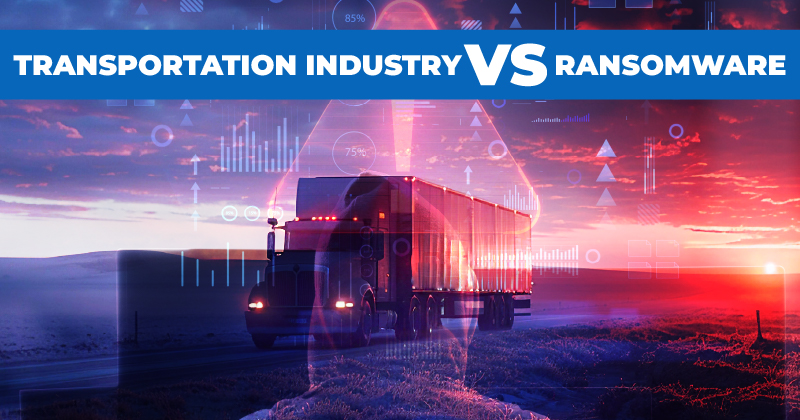
The transportation industry, encompassing aviation, maritime, and ground services, is increasingly becoming a target for ransomware attacks. This growing threat can be attributed to several unique characteristics of the sector. In this blog, we’ll explore why transportation is so vulnerable, the potential impacts of ransomware attacks, and the steps that can be taken to mitigate these risks.
The Interconnected Nature of Transport Services
One of the primary reasons the transportation industry is so susceptible to ransomware is its interconnected nature. Modern transport services rely heavily on integrated systems to ensure seamless operations. This includes everything from booking and scheduling systems to communication networks and operational technologies. Here are some key points to consider:
Multiple Points of Attack: The vast number of interconnected systems in transportation means there are numerous potential entry points for cybercriminals. Each system, if not adequately protected, can serve as a gateway for attackers to infiltrate the broader network.
Complex Supply Chains: The complexity and interdependence of supply chains in transportation mean that a successful attack on one service provider can have cascading effects on others. This interconnectedness can amplify the impact of a ransomware attack, making it more attractive to cybercriminals.
Knock On Effects and Increased Paydays
Ransomware attacks in the transportation sector can have far reaching consequences, disrupting not just the targeted company but also the businesses that rely on its services. This potential for widespread disruption increases the likelihood of attackers securing a significant payout. Consider the following:
Supply Chain Disruptions: Transportation services are integral to the smooth functioning of supply chains. An attack on a transportation provider can lead to delays, increased costs, and lost revenue for businesses dependent on timely deliveries. This potential for disruption makes companies more likely to pay the ransom to restore operations quickly.
Economic Impact: A ransomware attack in the transportation sector can be substantial, affecting multiple industries and leading to significant financial losses. This high-stakes environment makes the transportation sector an attractive target for ransomware attacks.
Critical Societal Function and State-Sponsored Threats
Transportation services play a crucial role in society, facilitating the movement of people and goods. This critical function makes the sector a target for state-sponsored actors seeking to cause widespread disruption and damage. Some key considerations include:
National Security: Transportation is a vital component of national infrastructure. A successful ransomware attack on transportation services can have severe implications for national security, including hampering emergency response efforts and disrupting the movement of military personnel and equipment.
Political Motivations: State-sponsored actors may target transportation services to achieve political objectives, such as undermining public confidence in government institutions or disrupting the economy of a rival nation. These attacks can be highly sophisticated and difficult to defend against.
 Understanding Ransom Demands
Understanding Ransom Demands
While specific data on ransom demands in the transportation sector is limited, general trends indicate that the median ransom amount is around $47,008. However, actual demands can vary widely based on the size of the targeted company, the extent of the disruption caused, and the attackers’ perception of the company’s ability to pay.
Mitigating the Risk of Ransomware Attacks
Given the significant risks of ransomware, transportation service providers must take proactive steps to protect their systems and data. Some effective strategies include:
Comprehensive Cybersecurity Measures: Implementing robust cybersecurity measures, including firewalls, intrusion detection systems, and regular security audits, can help prevent unauthorized access to critical systems.
Employee Training: Educating employees about cybersecurity best practices and the dangers of phishing attacks can reduce the likelihood of successful attacks.
Regular Backups: Maintaining regular backups of critical data ensures that companies can quickly restore operations without paying the ransom.
Incident Response Plans: Developing and regularly updating incident response plans can help companies respond swiftly and effectively to ransomware attacks, minimizing disruption and damage.
Conclusion
The transportation industry’s susceptibility to ransomware attacks is a growing concern, driven by the sector’s interconnected nature, the potential for widespread disruption, and the critical societal role of transportation services. By understanding these vulnerabilities and implementing robust cybersecurity measures, transportation service providers can better protect themselves against the ever-evolving threat of ransomware.
As a leading TMS services provider in the US, TMS-Digital is dedicated to supporting our clients in enhancing their cybersecurity posture. Our comprehensive suite of features and services is designed to safeguard your operations against ransomware and other cyber threats.
Stay vigilant, stay protected, and ensure your transportation services remain resilient in the face of cyber threats. Partner with us to safeguard your business and maintain the integrity of your operations in an increasingly digital world.









